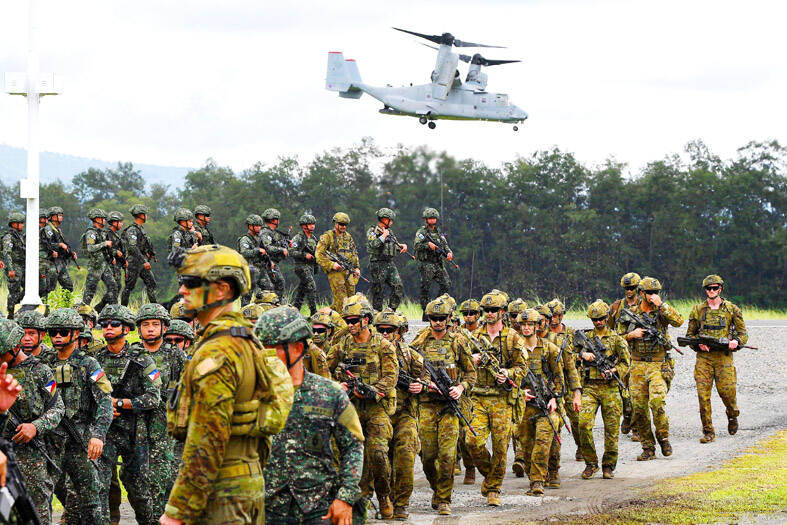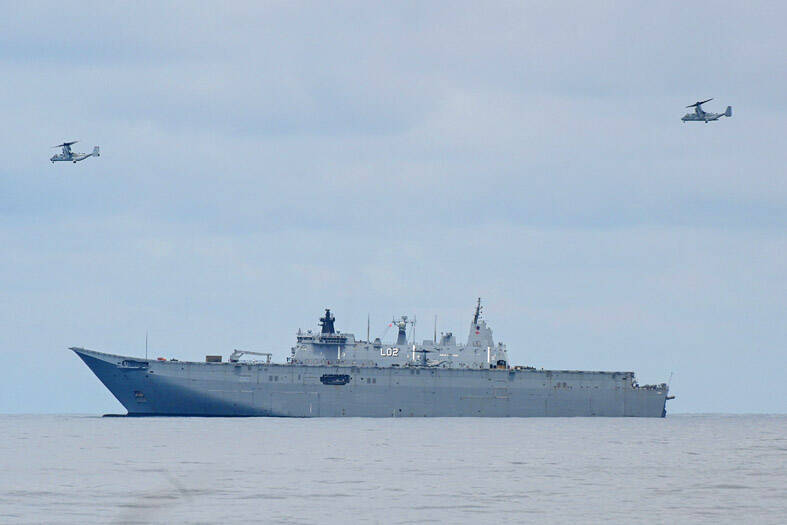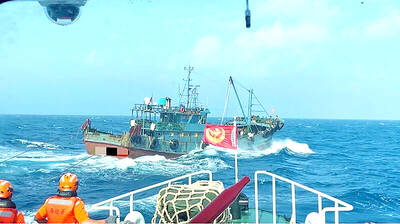The US, Japan, Australia and the Philippines are today to hold their first joint naval exercises, including anti-submarine warfare training, in a show of force in the South China Sea where Beijing’s aggressive actions to assert its territorial claims have caused alarm.
The four treaty allies and security partners are holding the exercises to safeguard “the rule of law that is the foundation for a peaceful and stable Indo-Pacific region” and uphold freedom of navigation and overflight, they said in a joint statement issued by their defense chiefs yesterday.
China was not mentioned by name in the statement, but the four countries reaffirmed their stance that a 2016 international arbitration ruling, which invalidated China’s expansive claims on historical grounds, was final and legally binding.

Photo: AFP
China has refused to participate in the arbitration, rejected the ruling and continues to defy it. The Philippines brought its disputes with China to international arbitration in 2013 after a tense sea standoff.
Last year, the Chinese Ministry of Foreign Affairs warned against military exercises involving the US and its allies in the disputed waters, saying they would harm its security and territorial interests.
“We stand with all nations in safeguarding the international order based on the rule of law that is the foundation for a peaceful and stable Indo-Pacific region,” the four nations said, without providing specific details of the drills, called the Maritime Cooperative Activity.

Photo: AFP
Japan said in a statement issued by its embassy in Manila that it would deploy its destroyer, the JS Akebono, for the South China Sea exercises, which would include anti-submarine warfare training and other military maneuvers.
“Japan believes that the issue concerning the South China Sea is directly related to the peace and stability of the region and is a legitimate concern of the international community including Japan, Australia, the Philippines and the United States,” Japanese Minister of Defense Minoru Kihara said in the statement.
“Japan opposes any unilateral changes to the status quo by force, such attempts as well as any actions that increase tensions in the South China Sea,” he said.
US Secretary of Defense Lloyd Austin said in a separate statement the exercises “underscore our shared commitment to ensuring that all countries are free to fly, sail and operate wherever international law allows.”
Aside from China and the Philippines, the long-simmering disputes in the South China Sea, a key global trade route, also involve Taiwan, Vietnam, Malaysia and Brunei.

The Republic of China (ROC) is celebrating its 114th Double Ten National Day today, featuring military parades and a variety of performances and speeches in front of the Presidential Office in Taipei. The Taiwan Taiko Association opened the celebrations with a 100-drummer performance, including young percussionists. As per tradition, an air force Mirage 2000 fighter jet flew over the Presidential Office as a part of the performance. The Honor Guards of the ROC and its marching band also heralded in a military parade. Students from Taichung's Shin Min High School then followed with a colorful performance using floral imagery to represent Taiwan's alternate name

COGNITIVE WARFARE: Chinese fishing boats transmitting fake identification signals are meant to test Taiwan’s responses to different kinds of perceived incursions, a report said Chinese vessels are transmitting fake signals in Taiwan’s waters as a form of cognitive warfare, testing Taipei’s responses to various types of incursions, a report by the Institute for the Study of War said on Friday. Several Chinese fishing vessels transmitted fake automatic identification system (AIS) signals in Taiwan’s waters last month, with one mimicking a Russian warship and another impersonating a Chinese law enforcement vessel, the report said. Citing data from Starboard Maritime Intelligence, the report said that throughout August and last month, the Chinese fishing boat Minshiyu 06718 (閩獅漁06718) sailed through the Taiwan Strait while intermittently transmitting its own AIS

CHINESE INFILTRATION: Medical logistics is a lifeline during wartime and the reported CCP links of a major logistics company present a national security threat, an expert said The government would bolster its security check system to prevent China from infiltrating the nation’s medical cold chain, a national security official said yesterday. The official, who wished to stay anonymous, made the remarks after the Chinese-language magazine Mirror Media (鏡周刊) reported that Pharma Logistics (嘉里醫藥物流) is in charge of the medical logistics of about half of the nation’s major hospitals, including National Taiwan University Hospital and Taipei Veterans General Hospital. The company’s parent, Kerry TJ Logistics Co (嘉里大榮物流), is associated with the National Committee of the Chinese People’s Political Consultative Conference (CPPCC) and the Chinese People’s Liberation Army (PLA), the

COVETED PRIZE: The US president would be a peace prize laureate should he persuade Xi Jinping to abandon military aggression against Taiwan, William Lai said US President Donald Trump should get the Nobel Peace Prize should he be able to convince Chinese President Xi Jinping (習近平) to abandon the use of force against Taiwan, President William Lai (賴清德) told a conservative US radio show and podcast in an interview. The US is Taiwan’s most important international backer, despite the absence of formal ties, but since Trump took office earlier this year he has not announced any new arms sales to the nation. Trump could meet Xi at the APEC summit in South Korea on Oct. 31 and Nov. 1. Lai, speaking on The Clay Travis and Buck Sexton